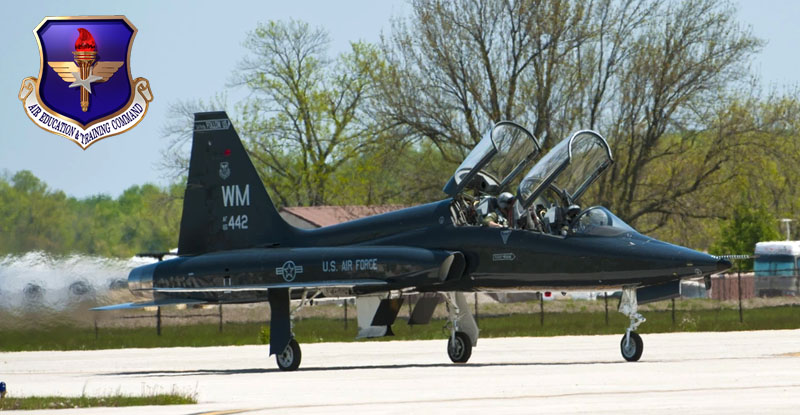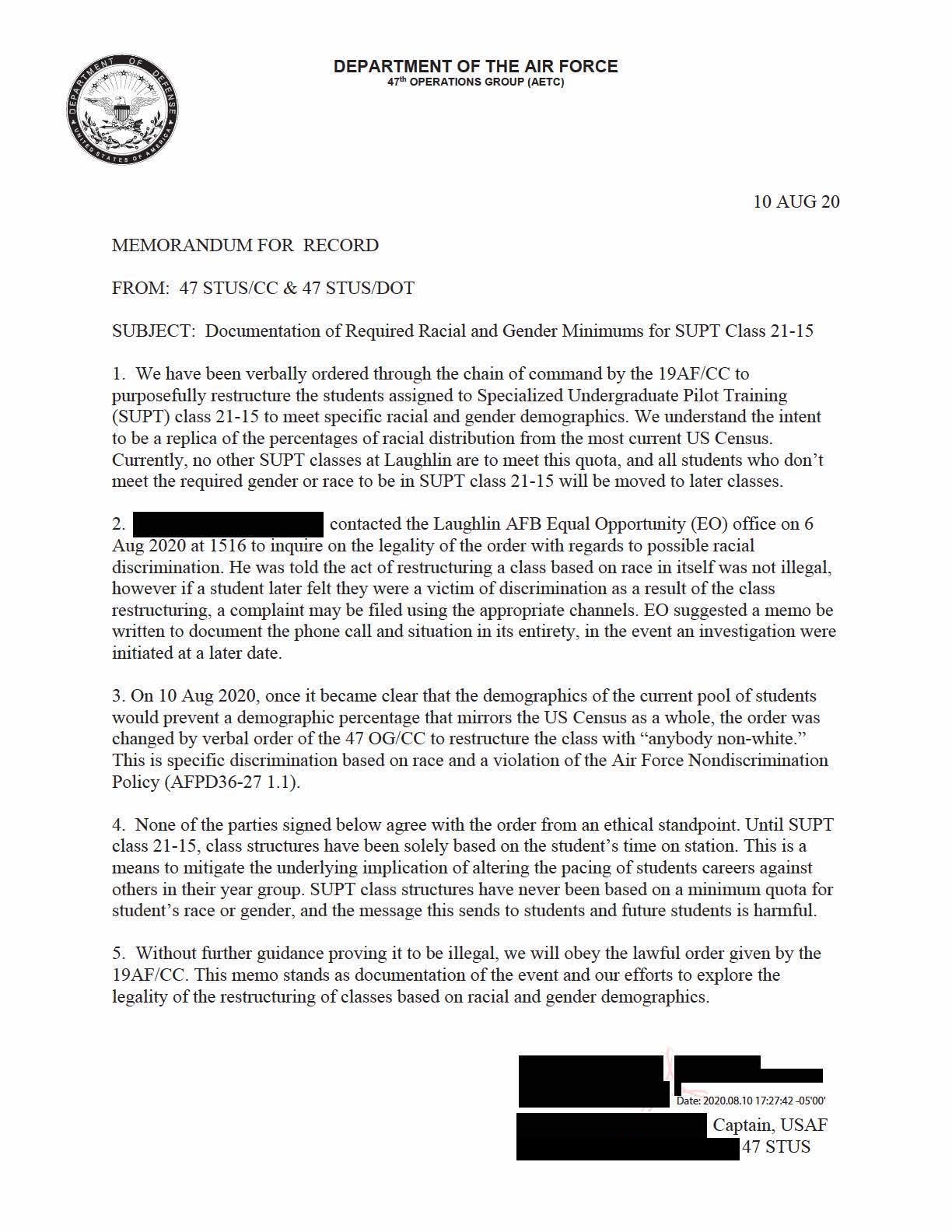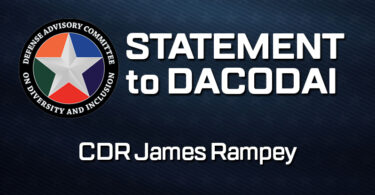The U.S. Air Force abandoned an experiment aimed at boosting pilot training graduation rates for women and minority pilots after the 2021 initiative failed to achieve the intended results and officers privately warned it could violate anti-discrimination policies, according to documents obtained by the Daily Caller News Foundation.
As part of the larger military-wide effort to promote diversity in the service’s pilot ranks, the 19th Air Force command near San Antonio, Texas, “clustered” racial minorities and female trainees into one class, dubbed “America’s Class,” to find out if doing so would improve the pilots’ graduation rates.
However, not only did the effort fail to boost minority and women candidates’ success rates, but officers involved say they were ordered to engage in potentially unlawful discrimination by excluding white males from the class, documents show.
Unlawful or not, the Air Force’s actions raised red flags for an active-duty pilot instructor who spoke to the DCNF.
“When other priorities, like gender or race, are introduced as a metric of assignment and advancement, the foundations of performance-based competition are sacrificed and the emphasis on safety takes a backseat,” a current Air Force instructor pilot and former trainer for Undergraduate Pilot Training, who spoke on a condition of anonymity due to fear of reprisal, told the DCNF.
A “significant backlog” of pilot candidates waiting to begin classes offered the 19th Air Force, which conducts pilot training for the entire service at Laughlin Air Force Base in Texas, a chance to build a class from scratch, a spokesperson for Air Education and Training Command (AETC) told the DCNF.
So, the 19th Air Force “clustered” candidates from “underrepresented groups” into Specialized Undergraduate Pilot Training (SUPT) class 21-15, with the initial intent of roughly mirroring the racial and gender makeup of the U.S.
Class 21-15 was known as “America’s Class,” according to a class patch also embroidered with the motto, “hand picked for excellence.”
The class ended up being comprised of at least 62% underrepresented groups, according to a demographic breakdown of classes from 2020 to 2023 obtained by the DCNF. The DCNF did not include males who chose the “other” option, which includes those who declined to specify their ethnicity, in that calculation.
All other classes for 2020 and 2021 are comprised of one-third or less underrepresented groups, the document shows.
‘Anybody Non-White’
Officers ordered to participate in the creation of class 21-15 expressed concerns that selection criteria amounted to unlawful discrimination, according to a memo obtained by the DCNF.
“We have been verbally ordered through the chain of command by the 19AF/CC [19th Air Force commander] to purposefully restructure the students assigned to [SUPT] class 21-15 to meet specific racial and gender demographics,” reads the 2020 memo signed by two 19th Air Force officers whose names were redacted.
The 19th Air Force initially intended the class to include roughly the same race, ethnicity and gender proportions as in the broader U.S. population, according to the memo, echoing the AETC spokesperson who explained the class to the DCNF.
However, as of fall 2020, base officials realized the demographics of the incoming cohort would prevent such an arrangement, and so the order was changed to exclude certain groups from the incoming class, the memo said.
“The order was changed by verbal order of the 47 OG/CC to restructure the class with ‘anybody non-white,’” on Aug. 10, the officers wrote.
Classes were previously structured on a first-come, first-served priority basis according to the number of months a student served in their unit, according to the memo.
One individual brought concerns about the order’s legality to the base’s equal opportunity office in August 2020, but he was told the class restructuring itself was not illegal, according to the memo. The equal opportunity office also instructed the unnamed individual to draft a memo documenting the complaint in case the situation came under investigation in the future.
However, the two officers who signed the memo argued base commanders violated the Air Force’s non-discrimination policy, which defines illegal discrimination as “any unlawful action that denies equal opportunity to persons or groups based on their race, color, sex (including sexual harassment), national origin, religion, or sexual orientation.”
“None of the parties signed below agree with the order from an ethical standpoint,” the officers wrote. “SUPT class structures have never been based on a minimum quota for a student’s race or gender, and the message this sends to students and future students is harmful.”
However, the officers pledged to obey the lawful order as given unless further inquiry showed it to be illegal.
“Each and every USAF pilot training class is America’s Class,” one of the authors, a captain and instructor pilot for the SUPT course, told the DCNF on condition of anonymity to discuss sensitive matters.
‘Harnessing Diversity’
The Air Force doubled down on efforts intended to improve diversity in the ranks in 2020 following the death of George Floyd, the Air Force Times reported. DOD identified a more extreme lack of racial and gender diversity among so-called “rated” officers, like pilots, who are most often promoted to top leadership positions.
AETC took the lead on diversity initiatives in rated career fields in 2020, according AETC’s website.
On March 17, 2021, AETC and the service’s top officials released a formal strategy to improve gender and racial diversity metrics in rated careers. The strategy calls for data-driven approaches to “develop and retain the Air Force’s best rated aircrew by harnessing diversity as a force multiplier and fostering a culture of inclusion.”
AETC’s strategy prohibits the use of numerical racial quotas for recruitment and promotions, or using race, religion, sex or sexual orientation as “a basis for admission to any training or development program.”
The strategy does, however, permit addressing “barriers and hindrances to cohesion among students and instructors” in training programs and to “remove rated minority and female aircrew integration and retention barriers.”
The rated strategy document, published as SUPT class 21-15 reached its midway point, is indicative of the Air Force’s broader strategy to diversify its ranks, a goal that’s only grown in importance under the Biden administration.
The “clustered” class graduated on Sept. 10, 2021, according to an AETC release. Based on photos included in the release, 22 students out of the 29 who began the class completed it. For comparison, the class before graduated 23 out of 26 students on Aug. 20, and the subsequent class finished on Oct. 1 with just 17 of 30 students, according to press releases.
Initial results and student feedback from the clustering experiment was “inconclusive,” the AETC spokesperson told the DCNF. Minority students did not progress at faster rates than in previous classes, and “not all students saw clustering as beneficial.”
While AETC has not completely discarded clustering as a strategy, “no further clustering activities are planned at this time,” the spokesperson told the DCNF, who pointed to curriculum changes allowing students to progress at an individualized rate rather than all together in a single class.
“AETC recognizes the potential clustering may have on UPT graduation rates, but that potential remains unproven in today’s UPT environment,” the spokesperson said. “AETC will continue to seek innovative and legally sufficient ways to further develop an atmosphere of dignity and respect for both students and instructors.”









Leave a Comment